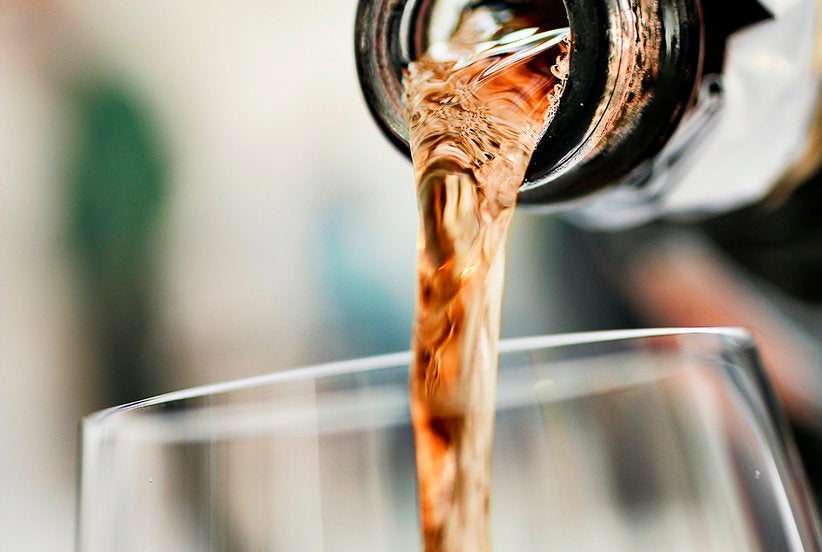
Orange wine is being called the “new” fall wine, but interestingly enough, it’s has been around a lot longer than you think.
Are orange wines made from oranges?
We hear this one a lot! The answer is simple: no, orange wine is not made from oranges!
Orange wine is just another way to describe a wine that is naturally-made with minimal intervention on the part of the winemaker/winegrower. Quite often, it is a wine that results when white grapes are left on their skins.
In reality, wine has been made in this way for centuries. However, it is enjoying a bit of a revival at the moment, with Northeastern Italy and Georgia leading the charge. The movement is a “terroir-ist” response to the globalization/homogenization of wine, and a way to provide differentiation for special terroirs – like we have here in Prince Edward County.
You may have noticed that the wines you purchase these days—especially mass-produced wines—often have similar characteristics. So similar, in fact, that the subtle differences of terroir (terroir being the sum total climate, soil, weather, and human intervention) have been eradicated from all but the most distinctive, hand-made wines. A trend back to natural winemaking processes has turned that paradigm on its head – but as romantic as that sounds, it’s not for everybody. Orange wine, you see, is remarkably different than most of the wines you are used to, so … brace yourself for a whole new experience!
On the winemaking side, some of these differences include:
- Grapes are crushed by hand instead of machine (stomped by feet, more like!)
- Small batches of heritage varieties are common
- Wild ferment with indigenous yeasts
- Using all of the grape must instead of losing 35% to filtration and racking
- Whole cluster ferment for white varieties
Because of the nature of the process used to make orange wine, certain grape varieties lend themselves more readily to the process. Since there is no addition of compounds that are foreign to grapes, such as acacia gum, oak, or cultured yeast, grapes that have a naturally high pH or searingly high acidity might not be appropriate as there can’t be any adjustments to the finished wine.
Orange wine is not rosé
 Although orange wine has a similar appearance to rosé, they couldn’t be more different. Rosé wines are made from red grapes and have only a little bit of skin contact, while orange wine is made from white grapes and often has skin contact of two weeks or more. The shade of orange varies with the grape variety and the length of time that the wine was left on the skins. The color can range from a light pink to a deep orange with tinges of brick in varying intensities.
Although orange wine has a similar appearance to rosé, they couldn’t be more different. Rosé wines are made from red grapes and have only a little bit of skin contact, while orange wine is made from white grapes and often has skin contact of two weeks or more. The shade of orange varies with the grape variety and the length of time that the wine was left on the skins. The color can range from a light pink to a deep orange with tinges of brick in varying intensities.
On the consumer (imbiber) side, you may notice:
- Herbal/savoury notes
- Cloudy appearance, as wines are bottled unfiltered and unfined
- A distinct orangey colour, as white wines gain colour from extended skin contact
- Sediment is common
- White wines can actually have tannin (something more commonly associated with red wines) from both skins and stems
Additionally, wines bottled on their lees stay fresher longer – meaning you can hold them back and enjoy the gradual changes the wine will no doubt display over time.
In conclusion, orange wines are in a category unto themselves, and they deserve it, they are extraordinary and distinctive wines with a story to tell. Currently, VQA is the only appellation system in the world that recognizes orange wines as their own category.
Ann Sperling, winemaker at Southbrook Estates in Niagara and Sperling Vineyards in the Okanagan Valley says: “Orange wines have seen a resurgence because both winemakers and consumers are curious. These wines explore a side of wine that has been ignored for a long time. If you grew up with wine, then perhaps you want something different from what your parents drank. Orange wines are often artisanal and they fit well with the trends we are seeing in cocktails and beers for small batch, herb infusions, back-to-basics philosophies, and fresh ingredients. It’s all about exploration.”
Now that you know a little bit more about orange wines, we invite you to give them a whirl!
Orange wines pair well with mildly spicy and flavourful foods but we don’t suggest anything too heavy – cream sauces, fried foods, or recipes that call for a lot of butter probably aren’t the best choices.
If you’re looking to introduce a new and interesting wine experience to your friends, orange wines are highly recommended. Ask a product consultant at your local LCBO for suggestions, and do check out Traynor Family Vineyard’s orange wine – it makes a distinctive hostess gift, too!












